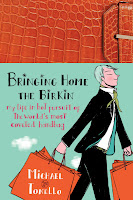 When I was creating the list of books for The Canadian Book Challenge, I thought it would be prudent to include a title from L.M. Montgomery because of the whole 100th anniversary of Anne celebration. The book I originally picked was Anne of the Island, which I had chosen because I thought it was the one about the First World War. Obviously, my memory’s a bit murky, considering I read all these books when I was about 10 years old, because the book I really wanted to read was Rilla of Ingleside (as I discovered in the bookstore).
When I was creating the list of books for The Canadian Book Challenge, I thought it would be prudent to include a title from L.M. Montgomery because of the whole 100th anniversary of Anne celebration. The book I originally picked was Anne of the Island, which I had chosen because I thought it was the one about the First World War. Obviously, my memory’s a bit murky, considering I read all these books when I was about 10 years old, because the book I really wanted to read was Rilla of Ingleside (as I discovered in the bookstore).
Of course, I remembered next to nothing about the book, so the whole reading experience was quite a surprise. It’s easy to see how all of the Anne books are so beloved, Montgomery has a way with characters and plot that flow like good conversation. You don’t care if the point of view flops all over the place, aren’t bothered by the funny little quirks in her writing, don’t mind that people float in and out of Ingelside with alarming frequency. There’s a heart to the books that’s so warm, inviting and, frankly, comforting that they act like the best of one’s childhood memories. You know those parts of you that were shaped by the person you were when you read Anne in the first place.
Rilla of Ingleside follows Anne’s youngest child, a free-spirited, surprisingly (in her words) unmotivated young woman from just before the war starts, through her miraculous changes otherwise known as growing up, to the months following the Armistice. Rilla’s adventures, her war baby (adopted), her Junior Red Cross moments, the lively cast of characters that inhabit her family home, they all combine to create a whimsical world I was happy to be lost in this week. The landscape reveals as much about the book as the spirit of the people in it, and I think it’s a huge part of the success of these novels.
I was listening to the CBC on Saturday afternoon when Ian Brown and guests were talking about Allison Pick’s poetry collection, The Dream World. While I haven’t read it, I was intrigued by their discussion around a line in one of the poems that describes the narrator knowing how she all about condoms and but not trees (I am doing a terrible disservice to Pick’s work right now and I do realize that; I’m sorry), and that idea stuck with me. It’s exactly the opposite in Montgomery’s work. She knows the plants, the trees, the hills, the water, the birds, the flowers, the bushes, the rocky paths, and that’s what brings the landscape to life, what makes it seem alive. In truth, it’s the heart of the books.
PHOTO IN CONTEXT: Just the cover, I’m afraid, and how very 1983. Awesome.
READING CHALLENGES: As I mentioned, it’s PEI, and the 8th book I’ve read for The Canadian Book Challenge. That means 5 to go!





